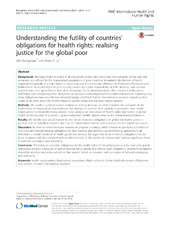| dc.contributor.author | Barugahare, John | |
| dc.contributor.author | Lie, Reidar K. | |
| dc.date.accessioned | 2016-07-26T07:04:32Z | |
| dc.date.available | 2016-07-26T07:04:32Z | |
| dc.date.issued | 2016-06-03 | |
| dc.identifier.issn | 1472-698X | |
| dc.identifier.uri | https://hdl.handle.net/1956/12318 | |
| dc.description.abstract | Background: Although health is a right of all individuals without any distinction, the realisation of this right has remained very difficult for the marginalised populations of poor countries. Inequitable distribution of health opportunities globally is a major factor in explaining why this is the case. Whereas the Protection, Promotion and Fulfilment of the health rights of poor country citizens are a joint responsibility of both domestic and external governments, most governments flout their obligations. So far disproportionate effort has been dedicated to reaffirming and interpreting these obligations as opposed to investigating the fundamental question regarding why these obligations have nevertheless remained largely unfulfilled. Further the normative question regarding what ought to be done about the shortcomings of current obligations has been largely ignored. Methods: We conduct a critical content analysis of existing literature on efforts towards the realisation of the health rights of marginalised populations in our attempt to ascertain their capacity to guarantee basic health opportunities to marginalised populations. In our analysis we treat issues of ‘health rights’ and ‘justice in global health’ as having unity of purpose – guaranteeing basic health opportunities to the marginalised populations. Results: We identify two sets of reasons for the failure of present obligations for global distributive justice in general: a set of ‘superficial reasons’ and a set of ‘fundamental reasons’ which account for the superficial reasons. Discussion: In order to overcome these reasons we propose a strategy which consists in specifying a number of minimum and less-demanding obligations for both external and domestic governments to guarantee to all individuals a certain threshold of health goods and services. We argue that these minimum obligations can be freely accepted and fully complied with or enforced with “a thin system of enforcement” without significant threat to national sovereignty and autonomy. Conclusion: The futility of countries’ obligations for the health rights of the global poor as is the case with global distributive injustice is because of lack of political will to specify and enforce such obligations. Minimum obligations should be specified and enforced with a “thin system” which is consistent with principles of national sovereignty and autonomy. | en_US |
| dc.language.iso | eng | eng |
| dc.publisher | BioMed Central | eng |
| dc.relation.ispartof | <a href="http://hdl.handle.net/1956/12319" target="blank">Can Resource-Poor Countries Bear any Obligations for Global Distributive Justice? A Reflection on the Distribution of Global health Opportunities</a> | |
| dc.rights | Attribution CC BY | eng |
| dc.rights.uri | http://creativecommons.org/licenses/by/4.0/ | eng |
| dc.subject | Health opportunities | eng |
| dc.subject | Marginalised populations | eng |
| dc.subject | Right to health | eng |
| dc.subject | Global distributive justice | eng |
| dc.subject | Obligations | eng |
| dc.subject | Low Income Countries | eng |
| dc.subject | Developing countries | eng |
| dc.title | Understanding the futility of countries’ obligations for health rights: realising justice for the global poor | eng |
| dc.type | Peer reviewed | |
| dc.type | Journal article | |
| dc.description.version | publishedVersion | |
| dc.rights.holder | Copyright 2016 The Author(s) | eng |
| dc.source.articlenumber | 15 | |
| dc.identifier.doi | https://doi.org/10.1186/s12914-016-0090-2 | |
| dc.source.journal | BMC International Health and Human Rights | |
| dc.source.40 | 16 | |

